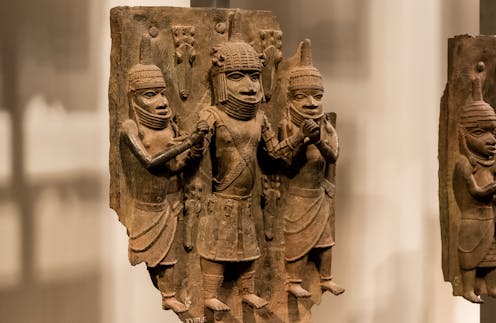
Momentum is growing for objects stolen during the colonial era that are now held in museums in Europe and North America to be returned to the places and communities that they were taken from. In this episode of The Conversation Weekly podcast, we talk to three experts about what happens to these objects once they’re returned and the questions their restitution is raising about the relationship between communities and museums in Africa.
The Benin bronzes are at the centre of the restitution movement. Many of these objects, made of brass, ivory, wood and other materials as well as bronze, were looted in 1897 when British soldiers invaded the Kingdom of Benin in what is today Benin City in Nigeria. Since then, they’ve been scattered in museums and collections around the world.
In early November, a new website was launched called Digital Benin cataloguing the location of 5,246 bronzes across 131 institutions in 20 countries. It comes as a number of collections are now moving to return the objects to Nigeria. In July, Germany signed a landmark agreement to transfer ownership of 512 Benin bronzes to Nigeria. A few have already been returned from the Metropolitan Museum of Art in New York, as well as from the universities of Aberdeen and Cambridge in the UK.
Nigeria plans to build a new museum in Benin City, the Edo Museum of West African Art, to house some of the returned objects. But some researchers think conversations about the objects’ future should extend beyond the national government and the present-day Oba, or king, of Benin. “There is a need to go beyond the elites and get to the members of the descendant communities whose ancestors produced and used many of these [objects] within their cultural context,” explains John Kelechi Ugwuanyi, a senior lecturer in the archaeology and tourism at the University of Nigeria in Nsukka.
Involving communities in the way artefacts are used and displayed is a longstanding issue for African museums, even for objects that were never taken abroad. Farai Chabata, a visiting lecturer at the University of Zimbabwe and senior curator of ethnography at the National Museums and Monuments of Zimbabwe, told us part of this stems from the history of some museums on the continent. For example, he says the Museum of Human Sciences in Harare, where he’s based today, was founded when Zimbabwe was a British colony with the primary objective to understand the colony. “What you then see is a museum which was not actually serving the community in its inclusive form, but these were very exclusive, elitist museums that largely served a colonial white minority,” explains Chabata.
If objects are displayed in museums as works of art, it can also strip them of their sacred meaning, according to Aribiah David Attoe, a philosopher at the University of the Witwatersrand in South Africa. “Some of those objects still retain their purpose or their usefulness in traditional societies,” says Attoe. “Perhaps we should give these objects their rightful place as religious objects, as sacred objects, not just artworks that can be displayed in museums, whether in Africa or in Europe or anywhere,” he says.
Listen to the full episode of The Conversation Weekly to find out more.
This episode was produced by Mend Mariwany and Katie Flood, with sound design by Eloise Stevens. The executive producer was Gemma Ware. Our theme music is by Neeta Sarl.
You can find us on Twitter @TC_Audio, on Instagram at theconversationdotcom or via email. You can also sign up to The Conversation’s free daily email here. A transcript of this episode will be available soon.
Listen to The Conversation Weekly via any of the apps listed above, download it directly via our RSS feed, or find out how else to listen here.
Aribiah David Attoe receives funding from the Global Philosophy of Religion Project Grant, facilitated by the John Templeton Fund. He's received funding in the past from the Centre for Leadership Ethics in Africa, University of Fort Hare and the Global Excellence Stature fund for Doctoral research, facilitated by the University of Johannesburg. He's a member and senior research fellow of the Conversational Society of Philosophy (CSP), Nigeria.
John Kelechi Ugwuanyi is also a postdoctoral research fellow at the Global Heritage Lab at the University of Bonn. He's recevied funding from Nigeria’s Tertiary Education Trust Fund and the American Council of Learned Societies and the Overseas Research Scholarship at the University of York. Farai Chabata is senior curator of ethnography for the National Museums and Monuments of Zimbabwe, based at the Zimbabwe Museum of Human Sciences in Harare.
This article was originally published on The Conversation. Read the original article.







